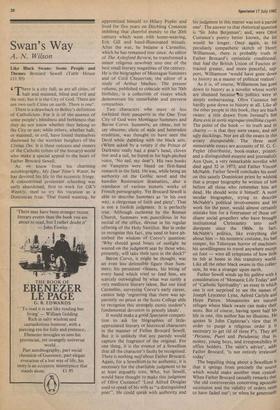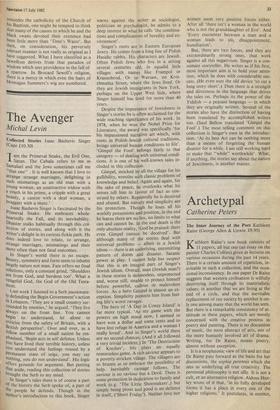Swan's Way
A. N. Wilson
'There is a city full, as are all cities, of halt and maimed, blind and evil and the rest; but it is the City of God. There are not two such Cities on earth. There is one'.
There is a drawback to Belloc's definition of Catholicism. For it is of the essence of some people's blindness and feebleness that they do not know whether they belong to the City or not; while others, whether halt, or maimed, or evil, have found themselves disowned by the worthier burghers of the Civitas Dei. It is these outcasts and sinners of the Catholic (often of the literary) world who make a special appeal to the heart of Father Brocard Sewell.
As we know from his charming autobiography, My Dear Time's Waste, he has devoted his life to the eccentric fringe. A conventional protestant schooling was early abandoned, first to work for GK's Weekly, then' to try his vocation as a Dominican friar. That found wanting, he apprenticed himself to Hilary Pepler and lived for five years on Ditchling Common imbibing that cheerful enmity to the 20th century which went with home-weaving, Eric Gill and hand-illuminated missals. After the war, he became a Carmelite, which he has remained ever since. As editor of The Aylesford Review, he transformed a minor religious newsheet into one of the best small literary magazines of the century. He is the biographer of Montague Summers and of Cecil Chesterton; the editor of a study of Arthur Machen. The present volume, published to coincide with his 70th birthday, is a collection of essays which demonstrate his remarkable and perverse sympathies.
Two characters who more or less forfeited their passports in the One True City of God were Montague Summers and Baron Corvo. Summers, an obese, not to say obscene; cleric of wide and heterodox erudition, was thought to have seen the Devil while dabbling with the black arts. (When asked by a votary if the Prince of Darkness really had a goat's head, cloven feet and a tail, he lisped in his high-pitched voice, 'No tail, my dear'). His two books on Vampires were based on first-hand research in the field. He was, while being an authority on the Gothic novel and the bawdier Restoration dramatists, also a translator of various esoteric works of French pornography. Yet Brocard Sewell is able to describe Summers as 'in his own way, a clergyman of faith and piety'. That is not a foolish judgment. It is perfectly true. Although outlawed by the Roman Church, Summers was punctilious in his recital of the office, devout in his regular offering of the Holy Sacrifice. But in order to recognise this fact, you need to have ab- sorbed the wisdom of Corvo's question: 'Why should good hours of sunlight be wasted on the judgment seat by those who, presently, will take their turn in the dock?'
Baron Corvo, it might be thought, was an even less defensible figure than Sum- mers: his persistent vileness, his biting of every hand which tried to feed him, are scarcely outweighed by what was surely a very mediocre literary talent. But our kind Carmelite, surveying Corvo's early career, cannot help 'regretting that there was ap- parently no priest at the Scots College able to recognise this strangely exotic student's fundamental devotion to priestly ideals'.
It would make a good Spectator competi- tion to ask for biographies of little- appreciated literary or historical characters in the manner of Father Brocard Sewell. But it is unlikely that any parody would capture the fragrance of the original. For one thing, it is the essence of a Sewellism that all the character's faults be recognised. There is nothing naif about Father Brocard. Again, for a Sewellism to be authentic, it is necessary for the charitable judgment to be at least arguably true. Who, but Sewell, would have thought to make this judgment of Olive Custance? 'Lord Alfred Douglas used to speak of his wife as "a distinguished poet". He could speak with authority and his judgment in this matter was not a partial one'. The answer to that rhetorical question is 'Sir John Betjeman'; and, were Olive Custance's poetry better known, the list would be longer. Once again, in his peculiarly sympathetic sketch of Henry Williamson, there is probably truth in Father Brocard's optimistic conditional, that had the British Union of Fascists at- tracted greater, and more peaceful, sup• port, Williamson 'would have gone down to history as a master of political realism'.
As it is, of course, Williamson has gone down to history as a novelist whose works are shunned becauseltis politics were so deeply embarrassing. Olive Custance has hardly gone down to history at all. Like all the other people in this book, they are black swans: a title drawn from Juvenal's line Rara avis in terris nigroque simillima cygno. The point of the book — its truth and its charity — is that they were swans, and not ugly ducklings. Nor are all the swans in this aviary disreputable. The three most memorable essays are accounts of H. G. C. Pepler (distributist, book-maker, printer, and a distinguished essayist and journalist); Ann Quin, a very remarkable novelist who died aged 32 in 1973; and Father Vincent McNabb. Father Sewell concludes his essay on this saintly Dominican priest by wishing that a proper biography be written of hint before all those who remember him are dead. He should write it himself. A more secular biographer, trying to describe McNabb's political involvements and his work for the poor, would almost certainlY mistake him for a forerunner of those sot' disant social gospellers who have brought institutional Christianity into such disrepute since the 1960s. In fact, McNabb's politics, like everything else about him — his eccentric costume, his bad temper, his Tolstoyan horror of machines, his unwillingness to travel anywhere except on foot — were all symptoms of how little he felt at home in this transitory world. Like all the other black swans in this collec- tion, he was a stranger upon earth.
Father Sewell winds up his gallere with a consideration of 'Monastic Life Today' and of 'Catholic Spirituality': an essay in which one is not surprised to see the names of Joseph Leycester Lyne, Aelred Carlyle and Hope Patten. Monasteries are natural refuges where black swans can make their nests. But of course, having spent half his life in one, this author has no illusions. He quotes St John Capistran's view that in order to purge a religious order it is necessary to get rid of three P's. They are 'Pecunia, Pueri and Petulantia; that is, money, young boys, and irresponsibility 10 office holders. The saint's advice', adds Father Brocard, 'is not entirely irrelevant today'.
The beguiling thing about a Sewellism is that it springs from precisely the source which would make another man cynical• When Father Brocard casually remarks that 'the old controversies concerning apostolic succession and the validity of orders seen"' to have faded out'; or when he generously
concedes the catholicity of the Church of his Baptism, one might be tempted to think that many of the causes to which he and the black swans devoted their existence had. been little more than 'Time's Waste'. But then, on consideration, his perversely tolerant manner is not really as original as I have suggested. What I have classified as a Sewellism derives from that paradox of wisdom which sees providence in the fall of a sparrow. In Brocard Sewell's religion, there is a mercy in which even the hairs of Montague Summers's wig are numbered.



































 Previous page
Previous page